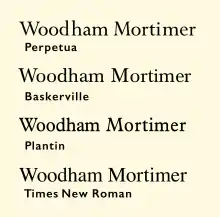تايمز نيو رومان
تايمز نيو رومان (بالإنجليزية: Times New Roman) هو خط لاتيني مذيّل صُمم لسهولة القراءة في نصوص على هيئة فقرات. طلبت بتصميمه صحيفة ذي تايمز البريطانية عام 1931، وصممه ستانلي موريسون (Stanley Morison) وهو المستشار الفني للفرع البريطاني للشركة الأميركية مونوتيپ (حروف المونوتيب) لتقنيات الطباعة، بالتعاون مع فكتر لاردنت (Victor Lardent) وهو خطاط في قسم التسويق لدى ذي تايمز.[1][2] مع أن صحيفة ذي تايمز لم تعد تستعمل هذا الخط، إلا أنه مازال مهما جدا في طباعة الكتب وفي الطباعة بصفة عامة،[3] وأصبح من أكثر الخطوط شعبية وتأثيرا في التاريخ، ويعد خطا اعتياديا على معظم الحواسيب الشخصية.[4][5]
تم إنشاء تايمز نيو رومان بفضل تأثير ستانلي موريسون من شركة مونوتيپ. كان موريسون المستشار الفني في مونوتيپ كما كان مؤرخ الطباعة ومستشارا غير رسمي لصحيفة ذي تايمز. عندما استشارته الصحيفة في إعادة تصميم، اقترح موريسون الاستعاضة عن الخط المجعد البالي المنتمي للقرن التاسع عشر المستخدم في المقالات بتصميم خط أكثر صرامة وصلبا يعود إلى تصاميم القرن الثامن عشر وما قبله،.[6][7][lower-alpha 1][11][12][lower-alpha 2] تماشيا مع الأذواق السائدة آنذاك.
استعملت صحيفة ذي تايمز خط تايمز نيو رومان خلال 40 عام، ولكن تسببت تقنيات جديدة والتحول من تصميم القطع الكبير إلى التابلويد في تغيير الخط المستعمل للنص الأساسي 5 مرات بين 1972 و2007. مع ذلك، إلا أن هذه الخطوط كلها مجرد بدائل معدلة لتايمز نيو رومان الأصلي.
صار تايمز نيو رومان ناجحا للغاية حالما أصدر للبيع التجاري، ويعد أكثر خط معدني مبيعا صممته شركة مونوتيپ.[13][14]

.jpg.webp)
مراجع
- Loxley, Simon (2006). Type: the secret history of letters. I. B. Tauris & Co. Ltd. صفحات 130–131. ISBN 1-84511-028-5. الوسيط
|CitationClass=تم تجاهله (مساعدة) - Hutt, Allen (1970). "Times Roman: a re-assessment". Journal of Typographic Research. 4 (3): 259–270. مؤرشف من الأصل في 5 مارس 2017. اطلع عليه بتاريخ 05 مارس 2017. الوسيط
|CitationClass=تم تجاهله (مساعدة) - Dreyfus, John (1973). "The Evolution of Times New Roman". The Penrose Annual. 66: 165–174. الوسيط
|CitationClass=تم تجاهله (مساعدة) - Farey, Dave (2014). "A Life and Times, Part 1". Ultrabold (16): 16–25. الوسيط
|CitationClass=تم تجاهله (مساعدة) - Farey, Dave (2014). "A Life and Times, Part 2". Ultrabold (15): 3–13. الوسيط
|CitationClass=تم تجاهله (مساعدة) - Rhatigan, Dan. "Time and Times again". Monotype. مؤرشف من الأصل في 19 أكتوبر 2018. اطلع عليه بتاريخ 28 يوليو 2015. الوسيط
|CitationClass=تم تجاهله (مساعدة) - Carter, H. G. (2004). ‘Morison, Stanley Arthur (1889–1967)’. Oxford Dictionary of National Biography,. rev. David McKitterick. دار نشر جامعة أكسفورد. الوسيط
|CitationClass=تم تجاهله (مساعدة)CS1 maint: extra punctuation (link) - Mosley, James. "Comments on Typophile thread". Typophile. مؤرشف من الأصل في 12 يونيو 2012. اطلع عليه بتاريخ 27 يوليو 2015. الوسيط
|CitationClass=تم تجاهله (مساعدة) - Rhatigan, Dan. "It was never called Times Old Roman". Ultrasparky. مؤرشف من الأصل في 12 أكتوبر 2018. اطلع عليه بتاريخ 27 يوليو 2015. الوسيط
|CitationClass=تم تجاهله (مساعدة) - Frere-Jones, Tobias. "Decompiled & Remixed History: The Making of Exchange". Frere-Jones Type. مؤرشف من الأصل في 30 مارس 2019. اطلع عليه بتاريخ 01 أغسطس 2017. الوسيط
|CitationClass=تم تجاهله (مساعدة) - Morison, Stanley. "Changing the Times". Eye. مؤرشف من الأصل في 14 أكتوبر 2018. اطلع عليه بتاريخ 28 يوليو 2015. الوسيط
|CitationClass=تم تجاهله (مساعدة) - Morison, Stanley. "Monotype Recorder: The Changing Newspaper" (PDF). Monotype Recorder. 35 (1). مؤرشف من الأصل (PDF) في 22 ديسمبر 2015. الوسيط
|CitationClass=تم تجاهله (مساعدة) - Badaracco, Claire (1991). "Innovative Industrial Design and Modern Public Culture: The Monotype Corporation, 1922–1932" (PDF). Business History Conference. 20 (second series): 226–233. مؤرشف من الأصل (PDF) في 4 مارس 2016. اطلع عليه بتاريخ 19 ديسمبر 2015. الوسيط
|CitationClass=تم تجاهله (مساعدة) - (تغريدة) https://twitter.com/. الوسيط
|CitationClass=تم تجاهله (مساعدة); مفقود أو فارغ|title=(مساعدة) Missing or empty |user= (help) Missing or empty |number= (help); Missing or empty |date= (help) - Gaultney, Victor. "Balancing typeface legibility and economy Practical techniques for the type designer". University of Reading (MA thesis). مؤرشف من الأصل في 15 ديسمبر 2018. اطلع عليه بتاريخ 13 أكتوبر 2017. الوسيط
|CitationClass=تم تجاهله (مساعدة)
- بوابة كتابة
- بوابة المملكة المتحدة
 صور وملفات صوتية من كومنز
صور وملفات صوتية من كومنز
- The Times's previous font was a Didone or Modern design; James Mosley reports that it is the face Monotype sold as Series 7 or "Modern Extended", based on typefaces by Miller and Richard.[8][9] Fonts of its kind were standard in nineteenth- and early-twentieth century newspaper printing.[10] Now little-known, the success of its replacement has led to it sometimes being called Times Old Roman in reference to its successor and a famous cover of Monotype's trade journal Monotype Recorder which presented it under this name. Computer Modern is somewhat similar.
- "The Changing Newspaper" articles in the Monotype Recorder are unsigned, but Allen Hutt, who also co-authored the issue, attributed them to Morison.[2]